In Alberta's radical remake of child care, costs are way down but the heavy lifting lies ahead
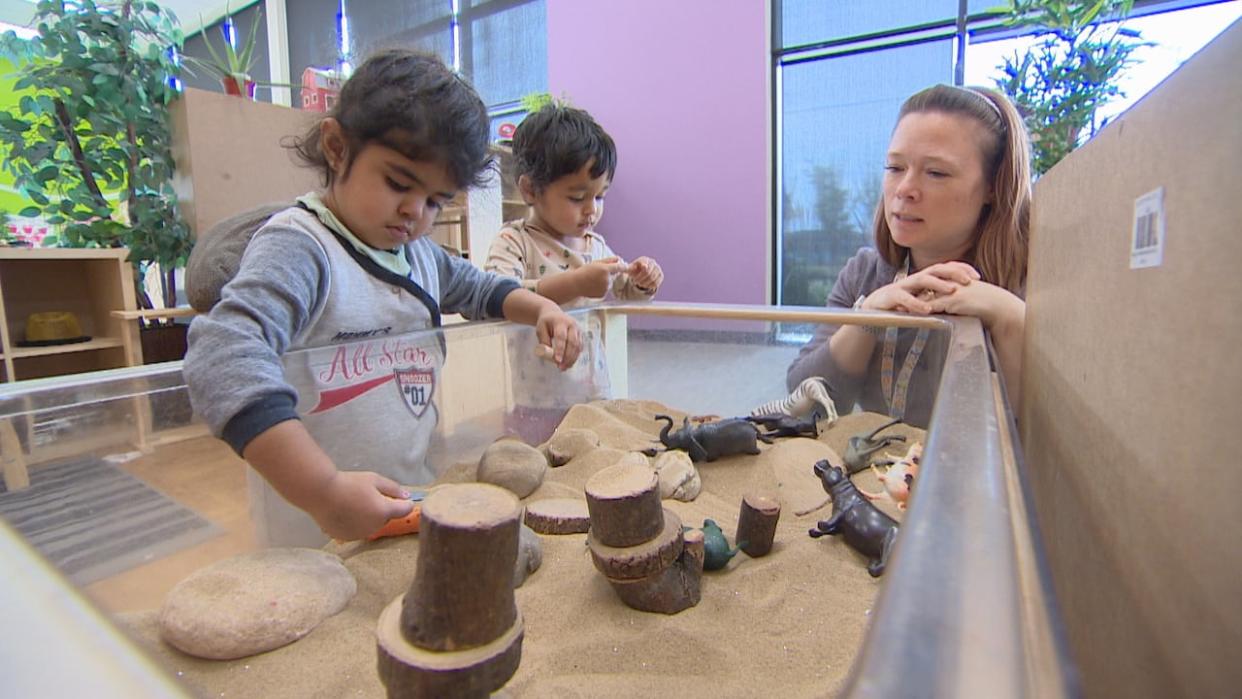
With inflation so high these days, it may seem like the price of everything is up. But there is one massive exception: child care.
Albertans with young children have seen dramatic — even life-changing — reductions in the cost of care since the provincial and federal governments signed an agreement just over two years ago aimed at bringing the average price down to $10 per day by 2026.
Before the agreement, parents in Alberta were often paying $70 per day, sometimes as much as $100. For many households, monthly child-care fees were larger than their mortgage payments. Some families had to weigh the cost of child care against the potential income of one parent returning to work.
Now, that calculation is much simpler. Since the agreement was signed, labour force participation among women aged 30 to 40, in particular, has surged to record levels in Alberta, boosting the province's GDP and income-tax rolls at the same time.
With $3.8-billion in federal funding commitments, the program has also helped create thousands of new child-care spaces and topped up the wages of the early-childhood educators who work at participating facilities.
And yet, the operators of some facilities are now balking at the next phase of the agreement, with some even considering opting out of the program altogether because of what they see as onerous restrictions that threaten the viability of their businesses. On Tuesday, more than a dozen facilities closed their doors for the day as a form of protest.
Some parents, meanwhile, have complained the actual fees they are paying are still higher than they were initially led to believe. And finding child care remains a challenge for many, with demand for new spaces — and workers — continuing to outpace supply.
These are the mixed results of a massive overhaul that's still underway, one that the Alberta government initially viewed with skepticism but has since embraced.
"This has actually been one of the greatest success stories of collaboration between the provincial government and the federal government," Searle Turton, Alberta's minister of children and family services, said in an interview.
The fundamental changes now being made are creating a more public role for what was once seen as the private affair of raising young children. Policy experts see these as the first steps in remaking the child-care system more in the vein of K-12 education. While there have been early successes, especially in terms of driving down costs for parents, these analysts say major challenges remain in continuing to grow the system while ensuring quality is maintained and, ideally, improved.
With such a major transformation, some growing pains are expected. But potential pitfalls lie ahead and the stakes of getting things right are higher than many people might realize. This tectonic shift in the way we care for and educate the youngest among us will have long-lasting implications, not just for the children and their parents, but society at large.
From private affair to public funding
For a long time, child care was left to individual families — primarily moms — to manage. Reliance on daycare facilities was sometimes derided as "a low-status, inferior substitute for home care."
The late 20th and early 21st centuries saw a shift in approach and attitude, however, with a growing focus on creating high-quality and accessible early-childhood education, similar to what exists for older children from kindergarten onward. At various levels of government and in civil society, frameworks were established, visions articulated and goals set.
Of course, actually achieving those goals is the tricky part — especially in a system like Canada's where responsibilities are split between the federal government and 13 provinces and territories.
Enter the Canada-Wide Early Learning and Child Care agreements, the federal Liberals' attempt to create a pseudo-national system. Their strategy was to offer boatloads of money to provincial and territorial governments in exchange for complex and binding agreements aimed at expanding child-care spaces and reducing costs for parents.
For a while, Alberta resisted trading its independence for Ottawa's money. The UCP government under former premier Jason Kenney described the federal plans — which came with a heavy emphasis on expanding spaces in non-profit facilities — as too "cookie-cutter" for the diverse child-care needs of Albertans. Kenney demanded more flexibility for parents and for-profit operators.
But, as the feds inked deal after deal with other provinces, pressure on the Alberta government grew.
"The amount of money that the federal government put on the table made it clear that there was no way the province was going to opt out of this. Just no way. Parents would have been infuriated," said Jeff Bisanz with the Edmonton Council for Early Learning and Care.
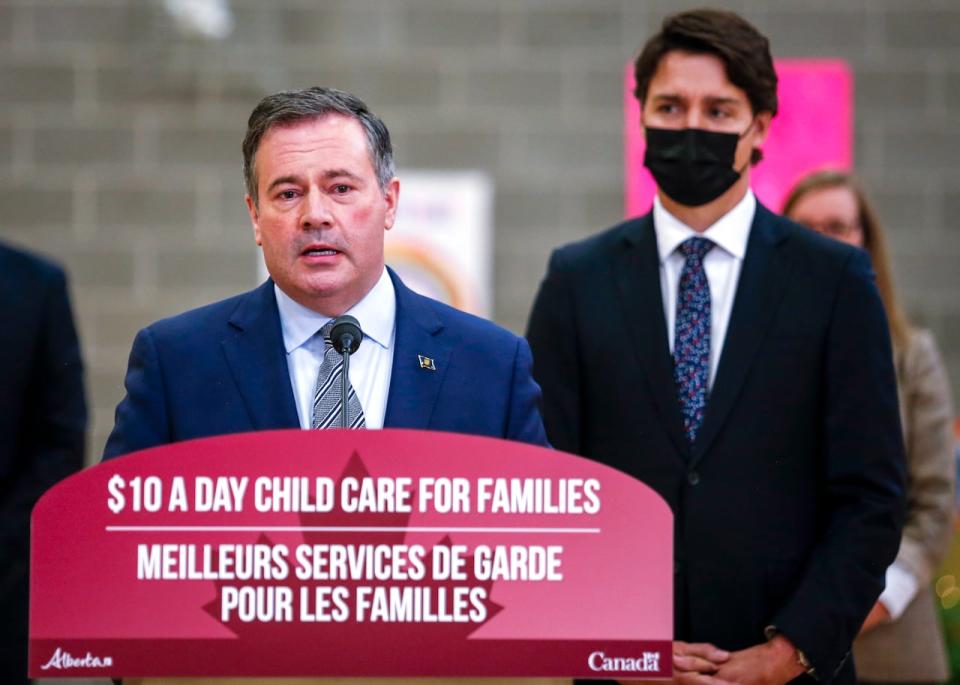
Prime Minister Justin Trudeau, right, looks on as then-premier Jason Kenney makes a child-care announcement in Edmonton on Nov. 15, 2021. (Jeff McIntosh/The Canadian Press)
In November 2021, Kenney relented, joining Prime Minister Justin Trudeau at a press conference to announce Alberta would indeed sign on to the federal agreement, which was rife with the type of commitments he had spent months resisting.
"Alberta agrees to use funds provided by Canada under this agreement to support the expansion of licensed child care, and prioritize not-for-profit," says the text of the agreement.
The agreement did include some leeway for a vaguely defined "for-profit expansion plan" as well, but the details on that were not spelled out until early 2023.
And they have been a point of contention ever since.
For-profit operators push back
Caught in the middle of this fundamental shift in child-care delivery were for-profit operators, who provided the majority of licensed spaces in Alberta when the agreement was signed.
Many of these operators are small-business owners, usually women, who have seen the economic ground shift beneath their feet repeatedly. Some have complained about a lack of consultation, even basic communication, as each new phase of the agreement rolled out and layered new rules on how they must operate and what they can charge.
In the early days of the agreement, some operators were clamouring to be included in order to access the grants and wage top-ups. More recently, some were considering opting out due to what they see as untenable financial constraints.
With a Jan. 31 deadline to sign on to the next phase of the deal, operators are faced with a dilemma, says Krystal Churcher with the Association of Alberta Childcare Entrepreneurs.
"You either sign on and you bleed out slowly and you're looking at bankruptcy eventually here, if we continue down this road — or you don't sign on and your families lose access to all of these amazing programs that are supposed to be supporting them," she said.
"It's a really difficult position to be in."
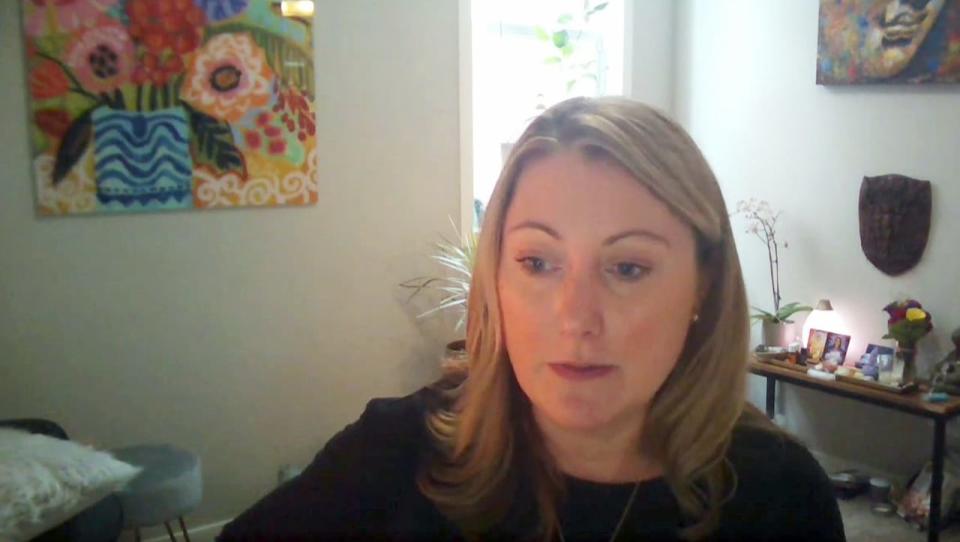
Krystal Churcher with the Association of Alberta Childcare Entrepreneurs speaks to CBC News via video chat in this file photo. (Google Meet/Screenshot)
In reality, she says, operators have little choice but to sign on to the deal. Opting out would cause parents' fees to skyrocket and staff wage top-ups to cease, putting operators at a massive competitive disadvantage to those who remain a part of the program.
Signing on, however, means operators must continue to limit fee increases to an amount well below inflation, accept government constraints and how they use their revenue, carry out the mandatory administrative paperwork and undergo regular audits, at their own expense.
The next phase also includes an increase in government grants, which is great news for parents: it's expected to drive down their average cost to $15 a day. But Churcher says it will actually worsen cash-flow problems for operators, given the financial structure of the system.
That's because the grants are dispersed to operators, not parents. Operators must reduce the monthly fees they charge by a corresponding amount, and are reimbursed by the government afterward.
But Churcher says it can take 40 to 45 days for the grants to reach operators, and they have to carry that difference until the funds arrive. When the grants increase, so too does that carrying obligation — and, for some operators, also the interest charges on the financing they are relying on to make it happen.
The minister in charge said the provincial government is "actively working towards addressing those concerns," but also said many operators receive their grants much faster than that, depending on when their paperwork is filed.

Alberta Minister of Children and Family Services Searle Turton. (Google Meet/Screenshot)
"From my perspective, it is a little overblown in terms of the impact that it's having an operators, in general," Turton said.
There are 2,316 licensed child-care programs in Alberta, according to the province's published list of facilities, but some of those consist of different programs offered by the same operator. The list includes 1,559 unique operators.
The province says there are now roughly 170,200 licensed child-care spaces, in total, which includes 99,000 in for-profit facilities, 55,000 in non-profit facilities and 16,200 home-based spaces.
The "vast majority" of operators have not only chosen to sign on to the new agreement, Turton said, but many are seeking to open new child-care spaces under the terms of the deal.
"We have over 410 applications from operators right over the province to actually expand their operations — to the tune of almost 30,000 additional spaces," Turton said.
It remains to be seen how many of those applications will translate into actual child-care spaces, but one thing is certain: more staff will be needed.
How to staff all those new spaces
In addition to reducing fees, the federal-provincial agreement aims to create 68,700 more child-care spaces in Alberta by April 2026.
The province says approximately 19,600 of those spaces had been created as of September 2023.
That's behind the overall rate required to meet the 2026 goal, but the pace of space creation has quickened since May 2023, when the province last provided updated numbers to CBC News.
Turton said more than 7,000 new early childhood educators (ECEs) have been hired since the federal-provincial agreement was signed. But thousands more will be needed in order to staff all the new spaces the agreement aims to create.
Recruiting and retaining those employees has been a challenge, according to the Association of Early Childhood Educators of Alberta, which has conducted research surveys and focus groups with child-care workers.
"There's high burnout, low pay," said Amanda Rosset, the association's chair.
Average hourly wages ranged from $16.79 to $19.88 prior to the federal-provincial agreement, depending on a worker's certification level.
With the new wage top-ups, those averages grew, especially for Level 3 ECEs, who saw theirs jump to $28.50.
But roughly 40 per cent of ECEs in Alberta are Level 1, whose average pay remains below the living wage in Calgary, even with the top-ups.
Rosset believes Alberta needs to develop a formalized workforce plan, which she sees as "a critical piece" in building a sustainable, long-term child-care system.
Her association advocates to transition ECEs into a recognized profession in the province, with consistent compensation across facilities, benefits, more opportunities for professional development and a wage grid similar to what teachers enjoy.
That will go a long way to attracting and retaining the workers needed to meet the province's expansion goals, she says, but so, too, will changing the perception of the work.
She says a narrative persists that ECEs are glorified "babysitters," which is an outdated view that doesn't recognize the training they receive and work that they do.
Bisanz, with the Edmonton Council for Early Learning and Care, agrees. He's also a professor emeritus of psychology with the University of Alberta and says modern ECE work is not something that just anyone can do.

Jeff Bisanz is a professor emeritus of psychology with the University of Alberta and a member of the Edmonton Council for Early Learning and Care. (Google Meet/Screenshot)
"I've got a PhD in child development; you wouldn't want me doing it," he said. "It's specialized work. It's hard work. Learning how to use play in an effective way to help children learn social skills, and so called pre-academic skills, that takes special training and education. And it takes time."
Better wages and working conditions are essential to attracting and retaining a sufficient pool of early-childhood educators, Bisanz said, which will be key not only to expanding access to child care but maintaining — and, hopefully, improving — the quality of care that kids receive.
In the meantime, simply finding adequate child care remains a challenge for many parents.
Expectations vs. reality
Sydney Miller lives in Bassano, Alta., located about 100 kilometres east of Calgary. She was lucky enough to get her two kids into the only licensed daycare in town, population 1,200, almost as soon as it opened in 2021.
But when the facility turned out not to be a good fit for her youngest child, she had to look for an alternative, of which there were few. She ended up putting the kids in the care of a trained but unlicensed provider, which meant losing the benefit of the government grants and subsidies.
"It's quadruple the cost," Miller said.

Sydney Miller says child-care options in Bassano (pop. 1,200) are limited. (Google Meet/Screenshot)
And she's not alone.
"We have people in town that are still using babysitters and the unpaid labour of relatives because there aren't spaces available," she said.
While Alberta is well on its way to bringing child-care costs down to $10 a day by 2026, Turton admits the heavy lifting on the program's other goals still lies ahead.
"The costs are actually maybe the easiest part ... because all you're doing is simply injecting funds into the system that's already developed," he said.
"There are other challenges with the other aspects, both on the space-creation side as well as attracting new workers."
As part of the federal-provincial agreement, he notes, funding is available to operators who want to create new child-care spaces.
Those grants are worth $5,000 per space for existing facilities and $5,500 per space for new facilities in areas deemed to have "high demand." In areas deemed to be "child-care deserts," with limited to no child care, the grants go up to $6,000.
Bisanz, however, said those grants "are drops in the bucket" compared to what it typically costs to create new spaces in purpose-built facilities and, in his view, not enough to spur the kind of space creation required to meet the agreement's 2026 goals.
Meanwhile, some parents who have managed to find child-care spaces for their kids say the most successful part of the program to date — the cost reduction — doesn't always live up to expectations.
Toward a $10 average for core costs
Last October, many parents who were still paying $30 or $40 per day for child care expressed skepticism about the provincial government's claim it had already reduced fees to "about $15 per day," en route to the $10-per-day goal by 2026.
The province later offered some clarification on that, conceding the actual number was actually $20 per day, on average, as of March 2023.
The province calculates that figure as a weighted average of core program fees. Any additional fees charged by some operators for "enhanced services" — such as transportation, field trips or other special programming — are not included.
This distinction between "enhanced" costs and "core" cost is also a key component of rules the province has imposed on for-profit operators when it comes to what they can charge to parents. These rules allow operators to charge extra for enhanced services but also assert that such services must be "optional and cannot limit a child's access to affordable child care."
Critics have raised concerns about this distinction from various angles.
Churcher, with the Association of Alberta Childcare Entrepreneurs, believes it creates the potential for two-tiered child-care delivery within a single facility, which "will lead to operational difficulties within centres and potentially cause harm to the social and emotional well-being of children."
Meanwhile, the opposition NDP has questioned whether it creates an opportunity for operators to circumvent the spirit of the fee caps.
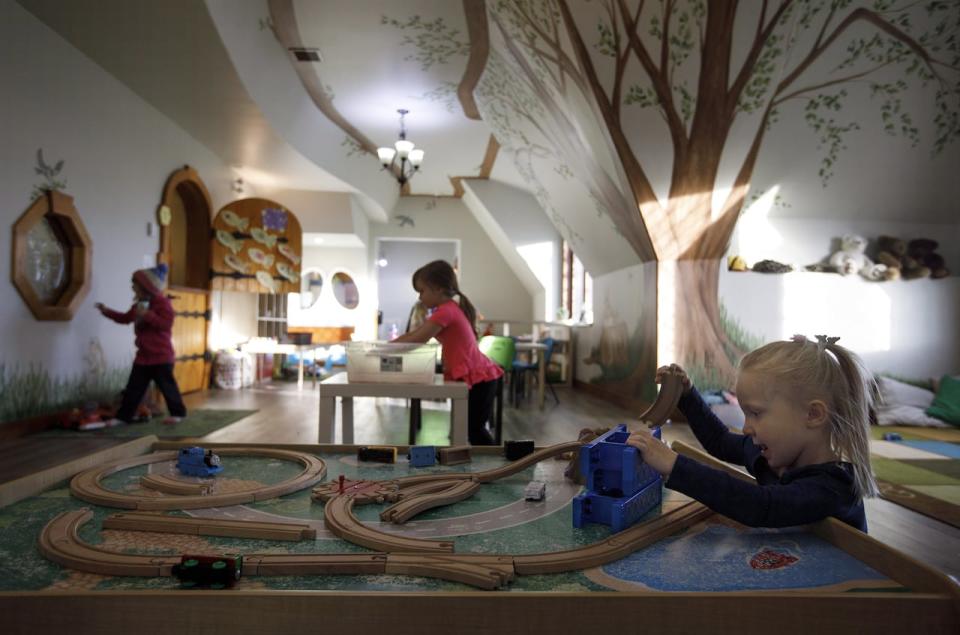
Kids play at Fable Child Care Centre in Morinville, Alta., in this file photo. (Jason Franson/The Canadian Press)
Some parents have complained about this already. Two Calgary moms spoke to CBC News about their frustrations with a local daycare chain that they say repeatedly hit them with new fees labelled as additional services, and provided copies of the fee schedules to prove it.
CBC News has agreed not to identify these parents or the daycare, because the parents worry it could create blowback for their children and affect their hunt for daycare spaces in the future.
One mom, who chose to leave the daycare over the fee increases, said it was frustrating to see their actual costs rise well beyond the three-per-cent cap that had been implemented.
She said the daycare used to include meals as part of its base fee but then suddenly started charging an extra $185-per-month meal fee, without reducing the base fee. On top of that, a separate "materials fee" grew from $15.75 per month to $45 per month.
When all was said and done, she said her actual cost for child care grew by more than 25 per cent, which was "just far too expensive for us to keep up with."
The parents want to see more clarity around what daycares can and can't charge extra for.
And a clause in a draft copy of the new agreement that operators must sign by Jan. 31, obtained by CBC News, does make that more explicit.
The clause states that, in order to receive the government grants, operators must agree not to charge extra for any services that were previously included within the base child-care fees or to "introduce or increase any administrative, operational, equipment or other overhead fees of a similar nature whatsoever."
Sorting out details like this is an inevitable part of the process when trying to transform a system so radically, says Rhonda Breitkreuz, a University of Alberta professor whose research has focused on child-care policy.
"Certainly we are in a period of transition," she said. "And the transition comes with bumps."
Looking at the bigger picture, though, she believes the federal-provincial agreement is laying the groundwork for a transformative change that will affect Albertan kids, parents and society itself.
(Really) long-term consequences
With the trajectory the agreement has set the province upon, Breitkreuz envisions a future where child care is delivered in a manner more similar to health care and education: with robust public funding, standards and universal access.
"I like to compare it to kindergarten," she said. "Kindergarten in our province is offered to five-year-olds. It's an entitlement. It's completely voluntary. And yet, 95 per cent of children in our province go to kindergarten."
It wasn't always this way, Breitkreuz notes, but kindergarten has become so established that it's effectively part of the education system, even if the province still classifies it as an early childhood service.
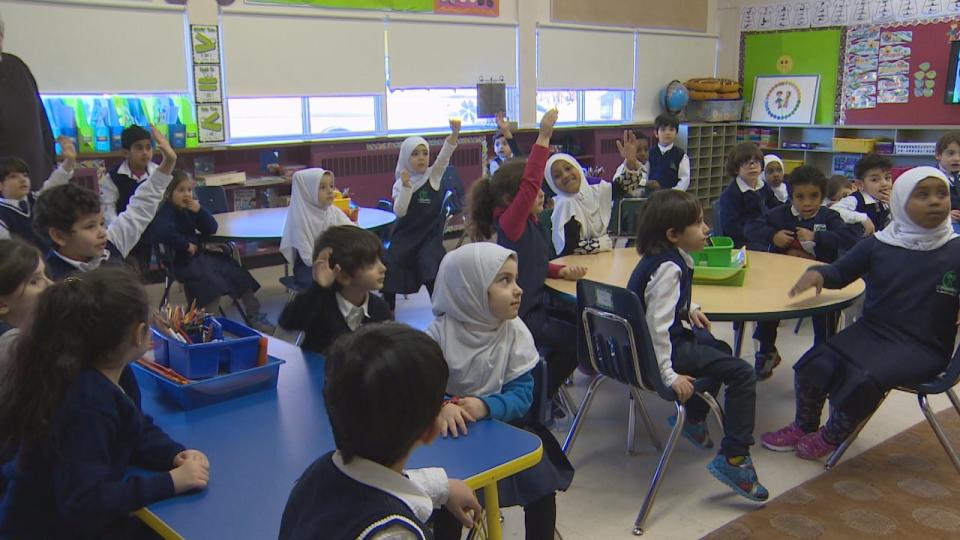
Kindergarten students at Al Mustafa Academy volunteer to help with a lesson in this file photo. Kids in Alberta are entitled to enrol in kindergarten, which can be delivered through public or private systems, but enrolment is not mandatory. (Travis McEwan/CBC)
"Kindergarten demonstrates that if you have a program that is well-funded, that has qualified staff that are well remunerated, you are going to get a quality system," she said.
"To date, child care hasn't had that, but I think right now we're at a unique time in Canadian history and the history of Alberta where there are some significant changes being made that could really make a difference."
Playing peekaboo, changing diapers, doing arts and crafts, reading stories and singing songs may seem like mundane tasks to some. But to researchers who study the formative years of early life, the consequences of this work are enormous.
"Children's early environmental influences shape their developing brain architecture and strongly affect whether they grow up to be healthy, productive members of society," reads a paper from Harvard University's Center on the Developing Child.
Right now we're at a unique time in Canadian history and the history of Alberta where there are some significant changes being made that could really make a difference. - Rhonda Breitkreuz, University of Alberta
Young brains are building more than a million neural connections every second and research has revealed the quality of care children receive in the first few years of life can affect everything from emotional regulation to gene function as children grow into adulthood and, eventually, into parents, themselves.
This is why advocates for early-childhood education believe, as important as it is to make child care more affordable, it cannot sacrifice quality in pursuit of that goal.
"A large body of research confirms that children benefit from participation in high-quality early learning and child-care programs," reads a 2021 report published by the Muttart Foundation, "while they receive little or no benefit from attending poor quality ones."
Bisanz, as a child-development expert, believes Alberta is at a critical juncture as it continues to transform its system. He says the final half of the current agreement could be make-or-break in achieving the multiple, overlapping goals the deal has outlined. He worries the most critical of those — child-care quality — hangs in the balance.
"I'm really concerned that quality is going to be sacrificed for accessibility and affordability," he said. "And that would be a huge, huge mistake."
Looking beyond 2026, when the current agreement is set to expire, Turton says another "large" funding commitment from Ottawa — no matter who is in charge at that time — will be essential to the future of child care in Alberta and the rest country.
"I want to make sure that the high-quality standards that many parents are looking for can be adequately funded by the federal government," he said.
"Leaving the provinces on the hook, to be able to fund this program that they started and walking away from the table, is not a viable option."


